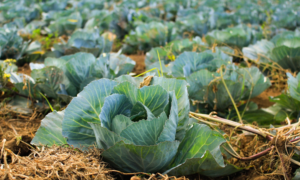- Organic farming offers an alternative that leverages locally available farm inputs to drive crop yields.
- By using compost, mulching, and integrated pest control, smallholders in Zimbabwe are cutting costs and overreliance on external inputs.
- Smallholder farmers are gaining valuable skills in organic practices through partnerships with entities such as the Fambidzanai Permaculture Centre.
In recent years, Zimbabwe has experienced a steady rise in organic agriculture as a sustainable alternative to conventional farming. Facing food security challenges exacerbated by climate change, erratic weather patterns, and limited access to fertilizers, Zimbabwean farmers have turned to organic methods as a solution.
Organic agriculture, which eschews synthetic chemicals in favour of natural farm inputs, is not only helping address food shortages but is also empowering smallholder farmers with resilient and ecologically sound farming practices.
The rise of organic agriculture in Zimbabwe
Organic farming in Zimbabwe is not merely a trend but a necessity born out of economic and environmental pressures. Traditional farming methods that rely on chemical inputs have proven costly. They have also proven unsustainable for smallholder farmers who struggle to access these resources.
Moreover, the high dependency on imported fertilizers has created a cycle of dependency that weakens the prospects for investors in the agricultural sector.
Zimbabwe’s Organic Producers and Promoters Association (ZOPPA) has been at the forefront of advocating for organic practices. ZOPPA works closely with farmers to build awareness around sustainable agricultural practices and create market opportunities for organic products.
Their initiatives include training farmers in composting, crop rotation, and other natural methods that enhance soil fertility and boost yields without depleting resources.
“Zimbabwean farmers are recognizing the value of organic farming not just for the environment but for the long-term viability of their livelihoods,” says a representative from ZOPPA. Through education and support, ZOPPA has been instrumental in promoting a shift toward an organic farming ethos that prioritizes ecological health and food security.
How organic farming is supporting food security
Zimbabwe’s food security issues are closely tied to environmental degradation and poor rainfall patterns. Organic farming addresses these challenges by improving soil health, conserving water, and building resilience against drought.
By using compost, manure, and other organic inputs, farmers are enhancing soil quality, which results in higher and more reliable yields.
Additionally, organic farming techniques such as crop diversification play a vital role in safeguarding food security. When farmers grow a variety of crops, they reduce the risk of total crop failure during adverse weather events.
This diversity also supports dietary variety and reduces malnutrition among communities reliant on smallholder agriculture.
Case in point: Chikukwa Ecological Land Use Community Trust (CELUCT)
CELUCT has made significant strides in educating and supporting smallholder farmers in Zimbabwe’s Chimanimani District. CELUCT deploys permaculture principles, encouraging farmers to grow multiple crops and build biodiverse, resilient systems.
The trust has become a model for community-driven organic agriculture, demonstrating that farming without synthetic inputs can yield sufficient produce to feed families while protecting natural resources.
CELUCT’s programs have allowed many farmers to thrive even when faced with drought, showcasing the power of sustainable farming in Zimbabwe’s rural areas.
Organic farming: A lifeline for smallholder farmers
Zimbabwe’s smallholder farmers, who make up over 70 percent of the country’s agricultural workforce, often struggle with access to resources such as synthetic fertilizers and pesticides.
Organic farming offers an alternative that leverages locally available resources. By using compost, mulching, and integrated pest control, smallholders cut costs and reliance on external inputs.
Smallholder farmers are gaining valuable skills in organic practices through partnerships with organizations such as the Fambidzanai Permaculture Centre. Established in 1988, Fambidzanai has been pivotal in training farmers in organic production and sustainable land use. Its programs have empowered farmers to reclaim degraded lands, increase productivity, and tap into niche organic markets.
“We’re equipping farmers with the knowledge they need to farm sustainably and profitably,” says a spokesperson from Fambidzanai. Their training programs are hands-on, allowing farmers to experiment with organic practices and see the benefits firsthand.
These programs have proven especially valuable for women farmers, who make up a critical part of Zimbabwe’s agricultural work force. By lowering dependence on costly inputs, Fambidzanai helps smallholders increase their income while protecting the environment.
Read also: COP29 Climate Deal Insfuccient, Developing Countries Decry
Economic opportunities in organic agriculture
The growing demand for organic produce, both locally and internationally, presents an economic opportunity for Zimbabwean farmers. As more consumers become aware of the health and environmental benefits of organic products, markets are opening up for produce grown without synthetic chemicals.
Zimbabwe’s organic sector has the potential to tap into regional and international markets, particularly in Europe, where organic food demand is on the rise.
The role of organic Africa
Organic Africa, a company that works with rural communities across Zimbabwe, has been instrumental in linking smallholder farmers to these emerging markets.
By providing organic certification support and guaranteeing purchase contracts, Organic Africa helps farmers secure fair prices for their products.
Organic Africa’s work has helped boost incomes for communities involved, with farmers benefiting from premium prices that organic certification commands. The company also invests in sustainable processing facilities and ensures that growers receive a share of the profits, creating a model of fair trade that uplifts entire communities.
“We are committed to not only building sustainable supply chains but also to improving the livelihoods of our partner farmers,” explains an Organic Africa representative. By offering certification assistance and training in organic standards, Organic Africa plays a critical role in professionalizing Zimbabwe’s organic sector.
Overcoming challenges in the organic farming sector
While organic farming presents numerous benefits, challenges remain. Limited infrastructure, inadequate government support, and difficulties accessing markets can hinder the growth of Zimbabwe’s organic sector.
Organic certification, while valuable, is costly and time-consuming, which limits the number of farmers who can access higher-value markets. Moreover, organic farmers often face competition from imported produce, which can be cheaper due to subsidies and economies of scale.
ZOPPA and other stakeholders continue to lobby for policy changes that would make organic farming more accessible. Supportive policies, such as subsidies for organic inputs or grants for certification, could help level the playing field. Additionally, infrastructure improvements—like better roads and storage facilities—would make it easier for organic farmers to reach markets and reduce post-harvest losses.
Future prospects: A vision for a greener Zimbabwe
The organic agriculture movement in Zimbabwe offers a promising path toward food security and economic resilience. With organizations such as ZOPPA, CELUCT, and Organic Africa leading the way, organic farming offers a chance to revitalize communities.
By promoting biodiversity, soil health, and self-sufficiency, these initiatives are building a foundation for long-term sustainability.
Looking ahead, there is potential for the organic sector to scale up significantly. If more farmers adopt organic practices, Zimbabwe could reduce its reliance on expensive imports and improve food sovereignty.
Additionally, with stronger support from the government and private sector, the country could position itself as a leading producer of organic crops in Africa, unlocking new economic opportunities.











